Spanish Courts grant precautionary measures against FIFA and the Royal Spanish Football Federation regarding fee caps imposed on football agents

In a judicial proceeding under the legal direction of Garrigues, the Commercial Court No. 3 of Madrid has issued an interim injunction ordering FIFA to refrain from applying the cap on football agents’ fees introduced by a recent FIFA Regulation and the Royal Spanish Football Federation (RFEF) to refrain from incorporating this cap into its internal regulations.
FIFA, as the world’s football governing body, promoted a regulation at the end of 2022 to regulate the activities of football agents at an international level (FFAR). Among other things, the regulation introduced a quantitative limitation on the fees of football agents by setting a maximum percentage limit on the fees that each agent can receive, depending on whom the agent represents in a given transaction (articles 15(1) and 15(2) of the FFAR).
FIFA justifies the adoption of these regulations as a solution to certain dysfunctions that it believes have arisen in recent years in the market of representation services to football players and coaches.
However, since its adoption, the Regulation has given rise to significant litigation in the European Union, as football agents consider that its provisions, and especially the limitation of the fees for their services, would not only seriously harm their income and the viability of their business model but would also be contrary to competition law, as it would constitute a serious infringement of Articles 101 and 102 of the Treaty on the Functioning of the European Union (TFEU).
In particular, various football agents and agents’ associations have initiated proceedings against FIFA - and the respective national federations - in Germany, the Netherlands and Belgium. Outside the European Union, proceedings have also been initiated against FIFA in the United Kingdom and Switzerland, on similar grounds.
As far as Spain is concerned, the Spanish Association of Football Players’ Agents and 18 other football agents (and agencies) filed a lawsuit against FIFA and the RFEF in July 2023 requesting the annulment of several articles of the FFAR for their anti-competitive nature. The legal direction and strategy of the proceedings was led and executed by Garrigues.
This action was accompanied by a request for interim measures to order FIFA to refrain from applying the FFAR fee cap during the pendency of the main proceedings and, consequently, to order FIFA to respect the status quo prior to the FFAR with regard to the absence of limitations on agents’ fees during that period.
Furthermore, it was also requested that the RFEF be ordered, as an interim measure, to refrain from transposing into its own national regulations the aforementioned fee cap (to which it was bound by the FFAR) and, therefore, to also respect the status quo prior to the FFAR as regards the absence of the fee cap.
The proceedings were heard by the Commercial Court No. 3 of Madrid. Following a preliminary injunction hearing held on 11 October 2023, the aforementioned court issued an order, notified on 6 November 2023, in which it fully granted the interim measures requested by the agents, finding prima facie a possible infringement, at least, of Articles 101 of the TFEU and 1 of the Spanish Competition Act.
An important milestone
The order of the Spanish Court represents a significant milestone in the private application of competition law at the European level, as it upholds an injunction against an organization such as FIFA, based in Switzerland, aimed at preventing the materialization of potentially anti-competitive conduct.
This order is also in line with the one issued in May by the District Court of Dortmund, which also granted interim measures against FIFA and the German Football Association in relation to the request made by certain German football agents. There is also a question that has been referred to the Court of Justice of the European Union for a preliminary ruling concerning the compatibility of the FFAR with EU law.
Contacts



